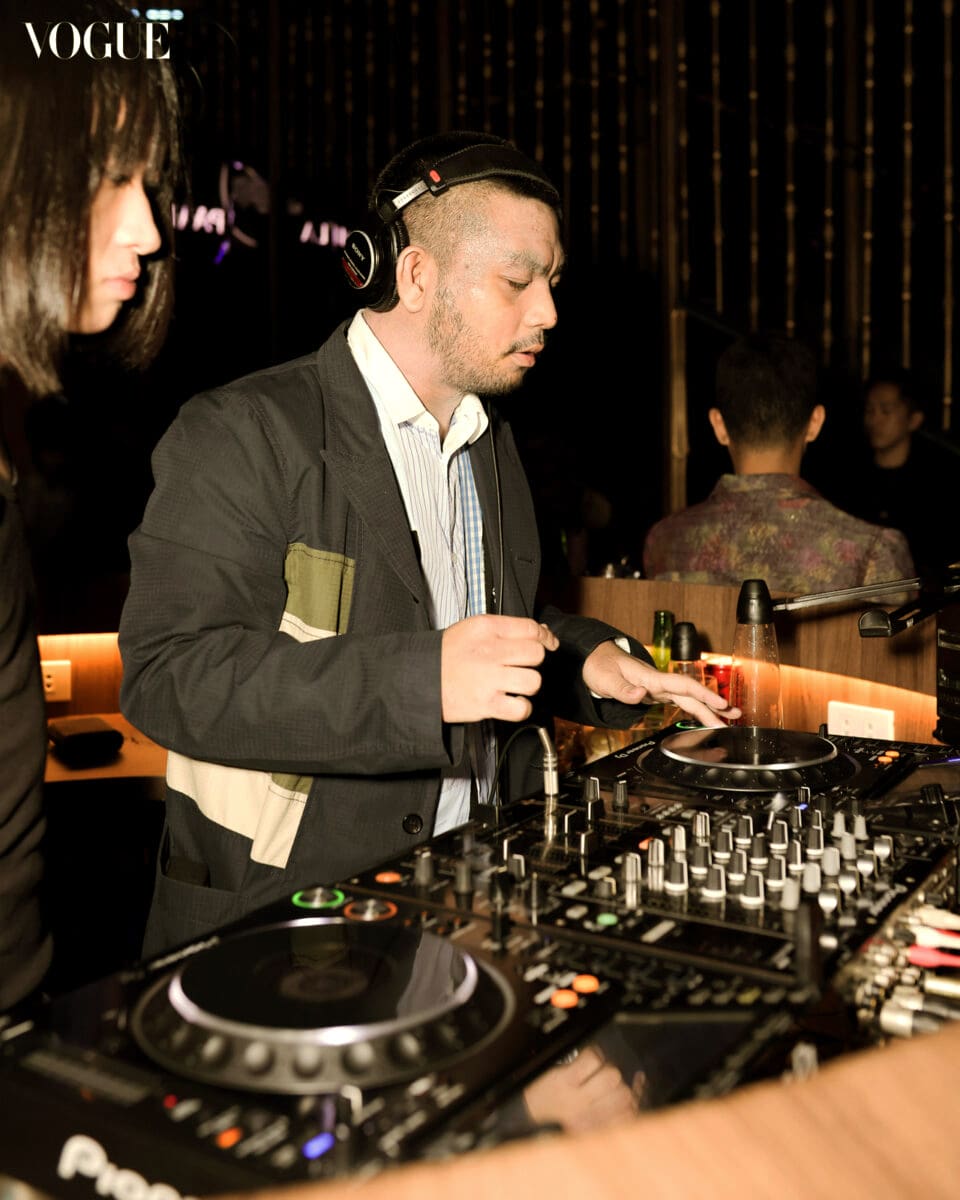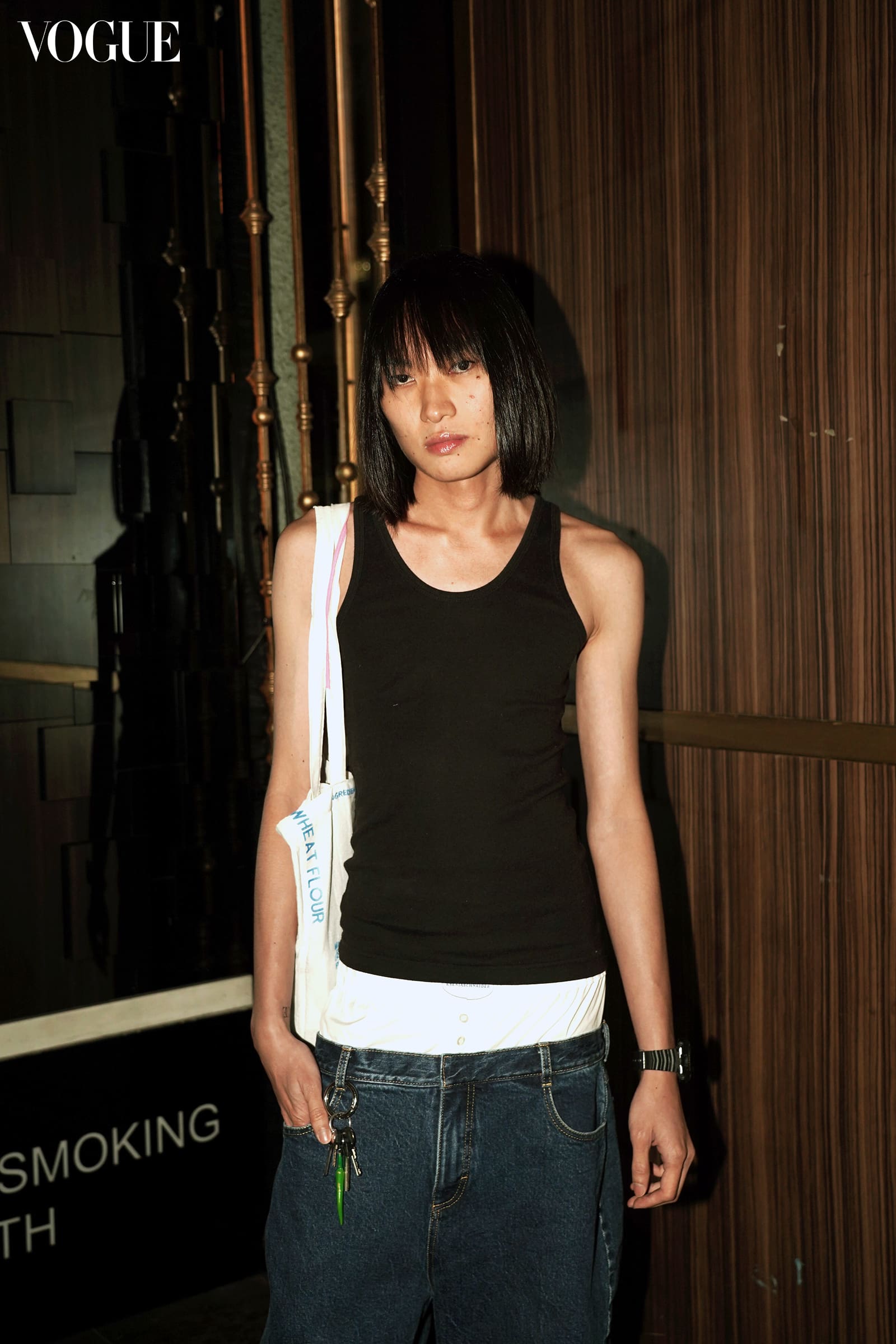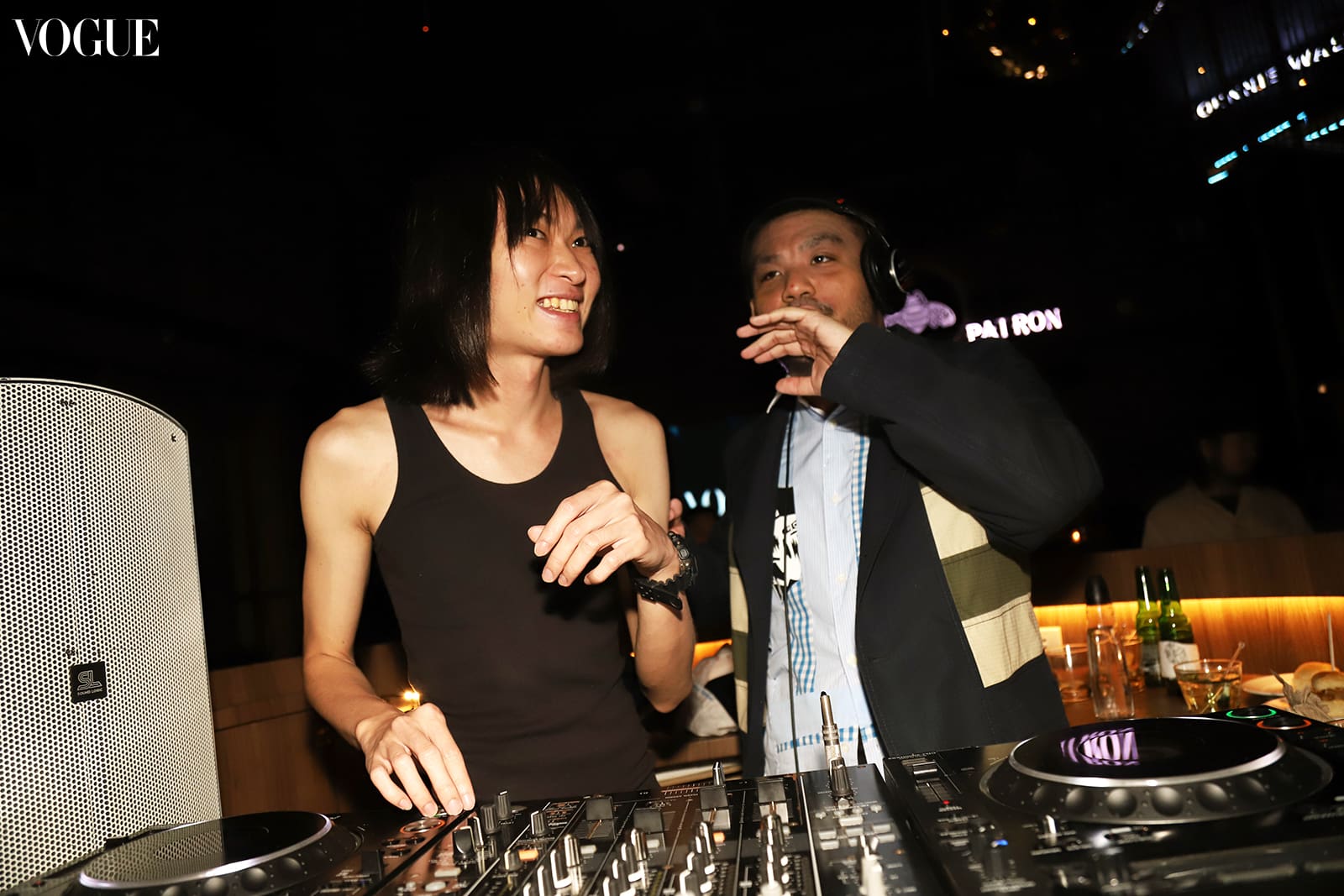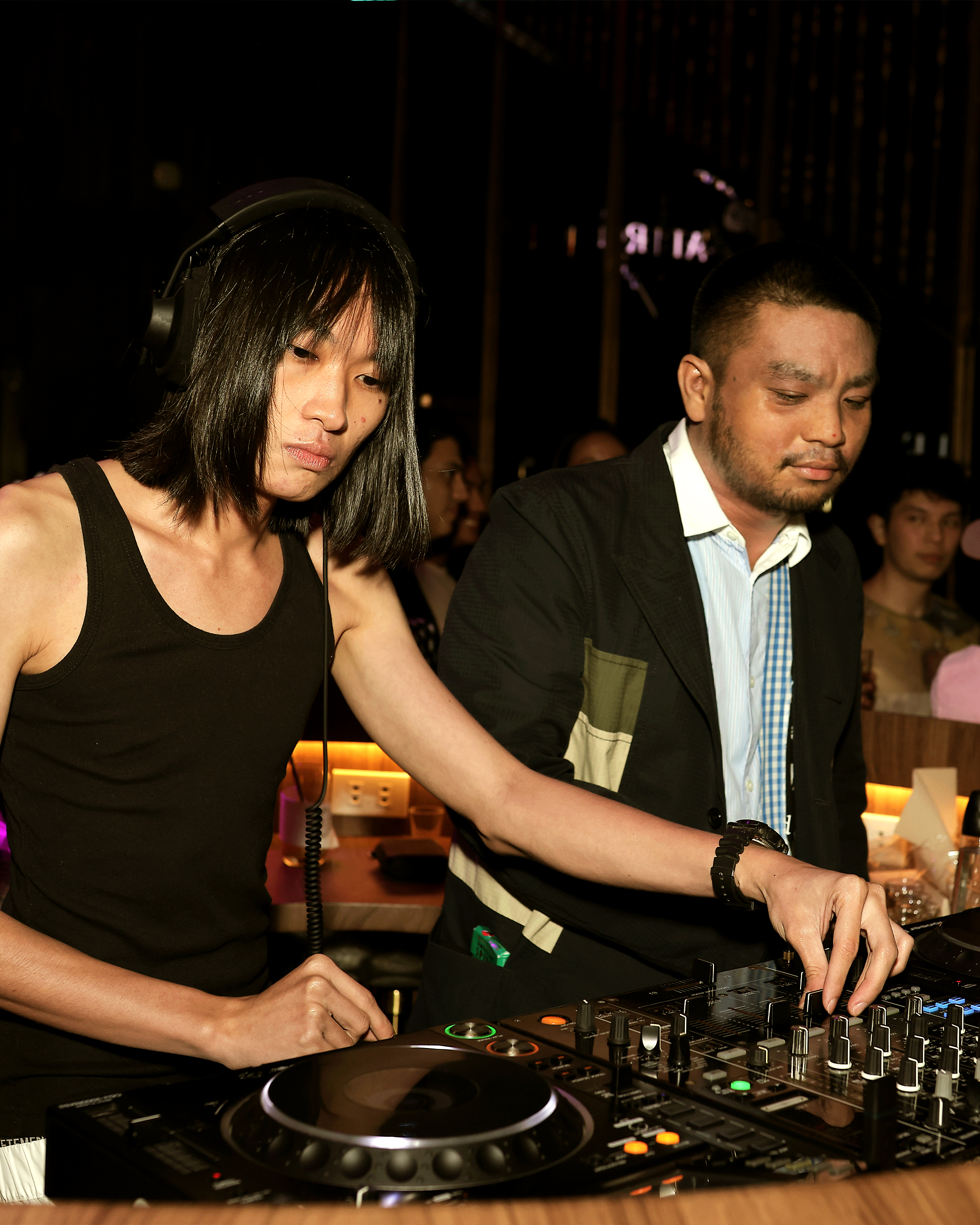Photo by Chapters
Javier Pimentel and Hideki Ito talk about the state and future of Filipino club culture, their DJ mothers, and their secret ways to dig for dance tracks.
On the night of Vogue Philippines’ Young Blood party, a group of veterans and young innovators converged and danced to an eclectic, 3-hour set ranging from Gen-X house music anthems to the Lizzie McGuire soundtrack all the way down to deep-cuts of techno. At one point, Everything But The Girl’s ’90s hit “Missing” was played, resulting in cheers from beauty editor Joyce Oreña. The soundtrack to this night was care of DJ Papa Jawnz (better known as Javier Pimentel to friends) and DJ Hideki Ito.
Javier and Hideki would take over the decks of Revel at The Palace, an institution in Manila’s nightlife, something the underground-leaning DJs did not expect. “Vogue was memorable,” he said of the experience. “I didn’t ever expect to play in Revel!”
But perhaps this is precisely what made the night so interesting. It was a night made to pass the torch to the innovators bringing in new perspectives and new sounds in the case of DJs Javier and Hideki.
Javier comes from organizations like Manila Community Radio, an online radio station that’s made a platform for grassroots genres like the Davao-original “Budots,” Transit Records, and BuwanBuwan Collective. Hideki, on the other hand, one of the 32 Young Blood in this month’s issue, hails from the circles associated with ELEPHANT Party, a monthly rave that’s garnered a cult following for its fearless pursuit of safe spaces for the queer community.

But Manila’s club culture has gained a new kind of richness in the community post-the pandemic, so much so that it might be reductive to write Javier and Hideki as belonging to separate, non-intersecting circles. They’ve played in the same party line-ups, become regulars of other emergent rave collectives such as SadoMasoDisco, and hang out with the same, ever-growing community—making family out of the Philippines’ artist and creative scenes.
But when the DJs aren’t on the decks, you can find them in their daytime dwellings. “I’m currently a magazine staff writer for Lomography. That’s my day job,” shares Javier. He’s a classic multi-hyphenate, releasing songs under his producer moniker Lui. as a freelance photographer whose work has been featured in an international magazine. Meanwhile, Hideki Ito is currently a multimedia arts student in their final semester: “I’ll be presenting my thesis presentation that resonates with me because it’s about my Kapampangan language dying. And my solution for it is a music label.” True to Hideki’s Young Blood status in Vogue’s May issue, they’re also a model and visual artist.

Vogue Philippines talks in-depth to Javier Pimentel and Hideki Ito about the state and future of Filipino club culture, their DJ “mothers,” and humble beginnings, and lets us in on their secret ways to dig for dance tracks.
Vogue: How did the both of you get into DJing?
Javier: I was a producer first. I learned under Jorge Wieneke [founder of BuwanBuwanCollective and Kindred Productions] in 2016, right before I entered college. But then I got into DJing, which was just a skill I wanted adjacent to producing. At the time, I was playing mostly HipHop, like J Dilla, a lot of beats, and a mix of Tame Impala. Then I got into dance music later on when I started frequenting clubs like XX:XX in Chino Roces and seeing more people spin dance music. Also, going to Japan and the Rainbow Disco Club and seeing the people who would eventually become my favorite DJs mix disco with techno, RnB, and everything. It would just be so eclectic, and it really changed me.
Hideki: It started with the techno song “Alarma” by 666. That track was the catalyst for me being a DJ […] The first time I heard “Alarma” as a child was in a local pageant, and they always used that track to dance to ethnic dances. So I’ve been too drawn to that ever since: making people move. But growing up, I’ve always been into music […] I would ask the pianist in our Christian school to teach me how to play the keyboard. I also grew up with my uncle, who used to be a sound engineer—I’d see him tinker with Cubase, an audio production software he’d use to edit or produce music, and he’d be so interested. And so I self-taught myself from that.
Vogue: Are you guys part of the same DJ crew?
Javier: Well, I’m closely associated with Transit, BuwanBuwan, and Manila Community Radio, but [the latter encompasses] pretty much everyone [in the DJ scene]. Hideki and I are pretty much in the same circles. We go to the same parties, hang with the same people, etcetera.
Vogue: I remember, before the pandemic, it was easier to distinguish the different circles from each other. And even though you, Javier, would visit XX:XX for ELEPHANT parties, parang it seemed like your circles just wouldn’t intersect as often as they do now in these events. What do you think?
Javier: That’s true.
Hideki: Prior to the pandemic, we [ELEPHANT] were just our own little space. We didn’t really have much interaction with other collectives—but after the pandemic, we tried to find ways to have a community again, and coincidentally, other collectives were also feeling that way. In that sense, there was a stronger desire to just connect again. [And because of that,] a stronger community emerged.
Javier: Yeah, before the pandemic, I’d go to ELEPHANT, but I didn’t really feel like I was part of it. But with everything closing during the pandemic and with Manila Community Radio trying to help keep [musicians] afloat and alive—we were just happy to be together again and catching up after the pandemic. Even before 2020, we’d only know each other [only to a certain level], we’d go to the same parties, had the same goals and music tastes. But we later found all our common grounds, and we really just started supporting each other from then. […] In Manila Community Radio and even in Transit, for example, we’ve become more purposeful in who we book. When we plan a lineup, we try not to be “Oh, let’s just get our friends again.” We try to make sure it makes sense.
Vogue: I remember ELEPHANT, in its earlier days before the pandemic, it would be a little more intimate–except for maybe some nights like BDSM ball or your Valentine’s Day parties–and maybe around 20 or 30 people would go. But your organization has since been attracting more and more regulars. What was it like having this sudden influx of interest in the party?
Javier: I do remember there would be times ELEPHANT would be super intimate.
Hideki: Yeah, prior to the pandemic. 10 people, 20 people.
Javier: Yeah, as compared to the first ELEPHANT [after the height of COVID-19], I remember [the organizers] were only supposed to book the 2nd floor of Dirty Kitchen, and then when they realized how many people actually bought tickets, that’s when they had to change the whole thing. I think around 300 people showed up, but they were only expecting like 50 people.
Vogue: In your 3-hour set during Vogue’s Young Blood party last May 15, you guys played an old-school trance song that was IG-storied heavily by some attendees familiar with your sets. This isn’t the first time your set attendees have done this, and what’s most interesting is that they always seem to tag this as the “Karlovvv” song. Can you tell us the story behind that?
Hideki: The song is “Beyond” by Silver. It’s a classic trance track. Karlo [Vicente, a DJ and founder of rave collective SadoMasoDisco] played it in one of his gigs, and he just kept on owning it until it became an inside joke for all the Filipino ravers that would go to his parties. It’s just a sound of what the music is right now. A trance track and a catchy tune.
Javier: It’s really catchy. He’s been playing it way before, but it wasn’t really his main track then. But it was just super catchy, so it became one of those things where people were demanding, “Oh, Karlo play that song!” Yeah, it just became an iconic song. Karlo and Jeric [SadoMasoDisco’s co-founder] would play their B2B (back2back DJ set) after every international guest; they’d always make “Beyond” their first song ‘cause it’s a good opener song as well. And it just caught on. Now, the joke is that we all play it at random venues in our own gigs, and we have to tag Karlo [in our stories] when it comes on. I mean, we played it at the Vogue gig.
Vogue: The club scene here, as it’s obvious, is a very tight-knit community. One that’s composed of many circles and clubs–it can get a bit overwhelming and hard to break into for up-and-coming DJs. If you’re lucky, a DJ takes you under their wing—becoming your “DJ mother” or mentor, so to speak. Who are your DJ mothers?
Hideki: Karlo [Vicente]. Siya talaga ‘yung mother namin [He’s really been my mother]. He enabled us to DJ: looking after us, booking us event after event, helping bring out our own individual sounds, and practicing DJing.
Javier: I would agree. Karlo’s influence in the DJ scene here is crazy, and even until now, you can still kind of feel it. I know he’s pushed for a lot of you guys [in ELEPHANT]. And it’s cool because when people think of Karlo, they don’t really realize how long he’s been in the scene. He has lived many lives.
Hideki: But who’s your DJ mother, Javier?
Javier: I think Sean [Bautista] because he really took care of me and other then-up-and-coming DJs of Transit. He’s really taken us on a lot of opportunities to DJ. His sound has also changed compared to the first time I first saw him DJ, but he’d always give good advice. Always push us. He’s such a big figure to a lot of people and has been a mentor to a lot of people because talking to him, he’ll really make you see a lot of different sides. But soundwise, I was influenced by Patrick Casabuena [a.k.a. Local Sun]—his taste in world music and disco. I was really amazed.
Vogue: How do DJs these days dig for their music?
Javier: Either I’m on YouTube, NTS Radio, or I listen to my favorite DJs’ mixes—there’s nothing wrong with getting tracks from your favorite DJs. That’s literally how tracks get passed around. I also dig on Bandcamp and Beatport—those are the best sources. Recently, Instagram has been really good. There are these Instagram accounts dedicated to rare vinyl digs, and I just keep bookmarking every post, and then I try and find it on like Soulseek or YouTube.
Hideki: It’s the same for me. Back then, I would go on YouTube and listen to like 1,000 songs in a day. But I would get only 10 or 5 tracks. I used to have so much time back then! Nowadays, I download [large] folders uploaded by other users [compiling their favorite tracks], and I would dig from that. Aside from that, it’s the same with Javier. I listen to other artists, try to get from their mixes or try back-to-back DJing with other friends.
Javier: Oh, like DJing with someone?
Hideki: Yes! I get to learn about new songs that way.

Vogue: What do you guys hope for the Philippines’ club scene?
Javier: More accessibility and I wanna play in more open-air venues. There’s an amphitheater in Marikina that’s perfect. And being able to just go around and play in different cities like Bacolod or Cebu. Just building those intercity relationships where people from different provinces can play here in Manila more often, or people from Manila can venture out and play in their turf and tour, I guess. More venues willing to take risks and make a cultural impact on our club scene. Lastly, [I hope for] us to build strong regional relationships as well. I always look at how Hanoi is able to send out their DJs to play in neighboring countries or is able to book international DJs as well. Just connecting to other SouthEast Asians and seeing how our music connects with each other would be really nice.
Hideki: I know there’s a charm about underground movements [like ours] being intimate and small…but I want it to grow and be more accepted by a large number of people. But when it gets to that point, it’d be very important to question why we’re doing this. […] And that’s what’s important: I want promoters, and DJs, and club owners to use this opportunity to inspire change and be an incubator of progress. Being an artist and being a creative, we have to think of and find new avenues to help our country.
